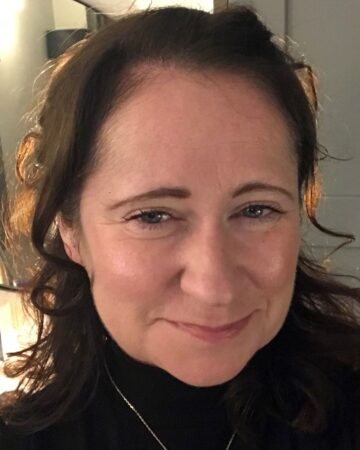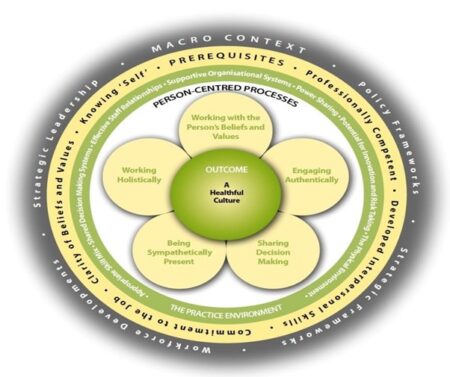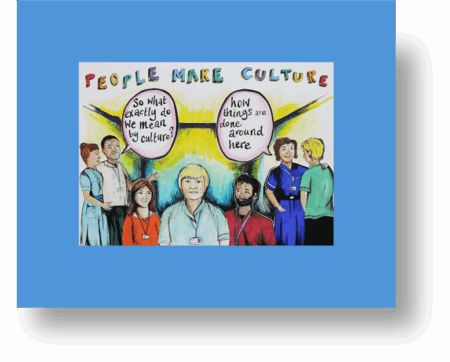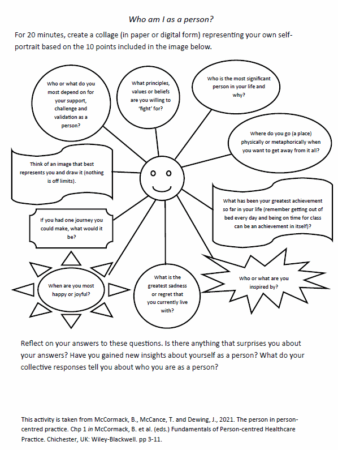Home News & Views Knowing Self
Knowing Self
 Sheila McGovern, FoNS Person-centred Practice Facilitator
Sheila McGovern, FoNS Person-centred Practice Facilitator
Hi there
I am guest editing this week’s newsletter while my amazing, wise, and kind colleague Debbie is on holidays. As I contemplated what I wanted to share, I decided to draw upon some work I am involved in presently on one of our culture change programmes.
One of the prerequisites of McCormack and McCance’s framework for person-centred nursing is “knowing self.”
Person-centred Practice’ Framework of McCormack and McCance (2017; 2019)

This is one of the areas we explore early in the process when we work with groups who want to bring about meaningful culture change within their teams and workplaces.
Why is this so important?
Because we can only truly support others in their growth if we first take the time to understand and work on ourselves. Culture change often requires us to unlearn old habits and relearn new ways of thinking and working – and that process starts with self-awareness.
“Knowing self” is essential because it encourages us to ask ourselves the challenging, reflective questions that help uncover the assumptions and hidden biases we may hold. This self-exploration is crucial when we are trying to change “how things are done around here”.

If we cannot recognise and confront our own habits and patterns first, we will struggle to truly understand what needs to change and will be less able to support others in challenging and reshaping theirs.
One of the tools we use to support this process is the Who am I as a person? activity from Chapter 1, page 5 of the Fundamentals of Person-Centred Healthcare Practice by Brendan McCormack et al, Wiley Blackwell.

I have loved seeing the insights participants get from completing this activity. In a safe and supportive environment this seemingly simple exercise can spark a powerful new conversation with ourselves – one that is both enriching and transformative. It can and has become the starting point of a whole new relationship with self. As facilitators of this exercise, it is of course important that we have also engaged in this activity so that we have experience of what might be happening for the people we are working with. Any time I have completed the activity, the results have been slightly different than the last time. This feels like an indication of my evolution as a human being in the world and how learning has changed who I am as a person.
When we facilitate this exercise, we offer participants to share what they feel comfortable sharing with another person in the group. It is important that when we do work on self that we don’t have to feel pressure to share everything we are learning about ourselves straight away and with everyone. Our insights are valuable and should be honoured as such and shared when and with whom we feel safe.
Another self- exploratory tool I have worked with when recently taking part in an Introduction to Dramatherapy course at Queen Margaret’s University, Edinburgh was the amazing poem, House of Changes by Jeni Couzyn.
After being introduced to the poem, we carried out an activity where we looked at what our internal house might look like. It was powerful, but I must add that reading the poem itself affected me deeply. I recognised myself in every character and as I speak it again today I have so much compassion for all those parts of me that I see as familiar. I feel that it’s a great reminder that many of us as healthcare professionals will have our own lived experience of physical and mental health issues and sometimes, that reality, can get lost in the day to day work.
I have shared this poem with many friends, and it has created much discussion.
I would be interested to know what you hear in it if you feel like sharing but also offer you a quiet prompt to please be kind to yourself when partaking any work on self. John O’Donohue, another of my favourite writers, reminds us in his lovely book Anam Cara, to be gentle with ourselves when scraping the “clay away from our hearts”.
It is important to know ourselves to grow but relentless self-scrutiny is not helpful and does not lend itself to healthy growth.
HOUSE OF CHANGES
My body is a wide house
a commune of bickering women,
hearing their own breathing
denying each other.
Nearer the door
ready in black leather
is Vulnerable. She lives in the hall
her face painted with care
her black boots reaching her crotch
her black hair shining
her skin milky and soft as butter.
If you should ring the doorbell
she would answer
and a wound would open across her eyes
as she touched your hand.
On the stairs, glossy and determined
is Mindful. She’s the boss, handing out
punishments and rations and examination
papers with precise
justice. She keeps her perceptions in a huge
album under her arm
her debts in the garden with the weedkill
friends in a card-index
on the windowsill of the sittingroom
and tape-recording of the world
on earphones
which she plays to herself over and over
assessing her life
writing summaries.
In the kitchen is Commendable
the only lady in the house who
dresses in florals
she is always busy, always doing something
for someone
she has a lot of friends. Her hands are quick and
cunning as blackbirds
her pantry is stuffed with loaves and fishes
she knows the times of trains and
mends fuses and makes
a lot of noise with the vacuum cleaner.
In her linen cupboard new ironed and neatly folded,
she keeps her resentments like
wedding presents – each week
takes them out for counting not to
lose any but would never think of using any
being a lady.
Upstairs in a white room
is my favourite. She is Equivocal
has no flesh on her bones
that are changeable as yarrow stalks.
She hears her green plants talking
watches the bad dreams under the world
unfolding
spends all her days and nights
arranging her symbols never sleeps
never eats hamburgers
never lets anyone into her room
never asks for anything.
In the basement is Harmful
She is the keeper of weapons
the watchdog. Keeps intruders at bay
but the others keep her
locked up in the daytime and when she escapes
she comes out screaming
smoke streaming from her nostrils
flames on her tongue
razor-blades for fingernails
skewers for eyes.
I am Imminent
live out in the street
watching them. I lodge myself in other people’s
heads with a sleeping bag
strapped to my back.
One day I’ll perhaps get to like them enough
those rough, truthful women
to move in. One by one
I’m making friends with them all
unobtrusively, slow and steady
slow and steady.
©Jeni Couzyn 1978 From Life by Drowning: selected poems published by Bloodaxe Books, 1985
I would like to thank Jeni Couzyn for her beautiful writing and for allowing me permission to share her poem here.
Working on self is a good place to start when aiming to support others in culture change. When we create the opportunity to work on ourselves and confront our own conscious and unconscious biases, we can make real change in the world. Next week I will be sharing thoughts on a discussion we had as FoNS facilitators of Resilience Based Clinical Supervision on the topic of supporting ourselves and others to have more open conversations around bias and racism in healthcare.
Comments are closed.

